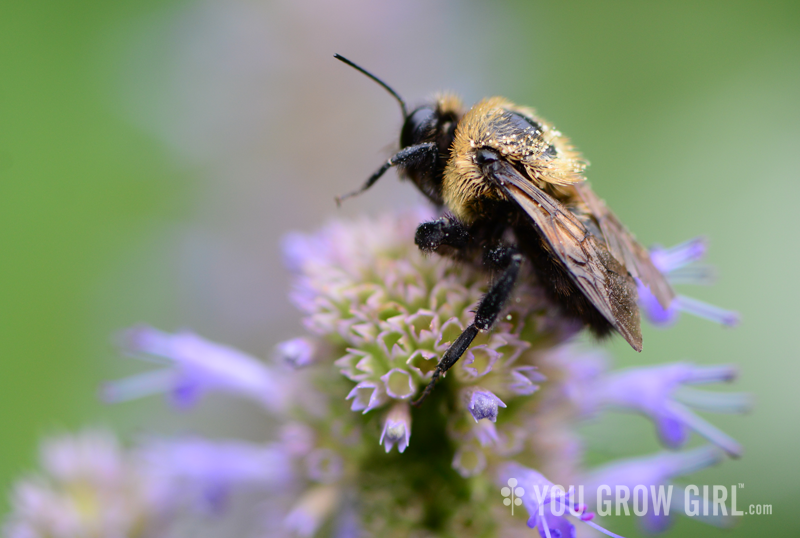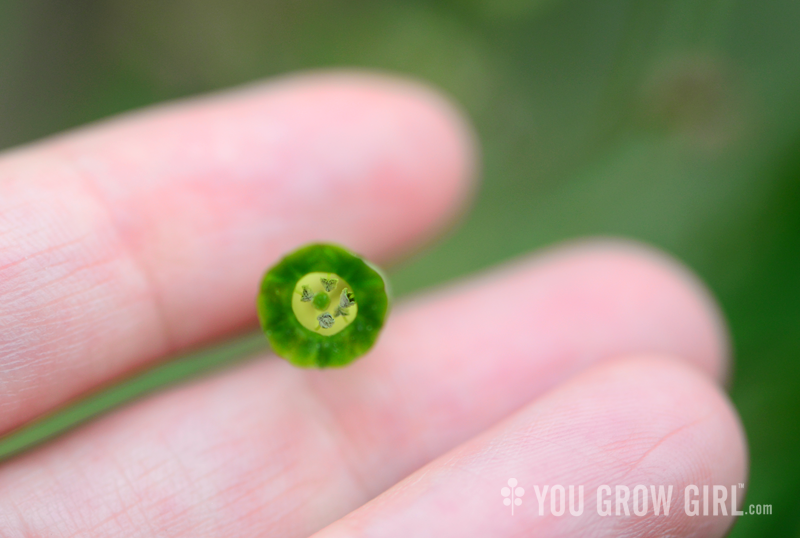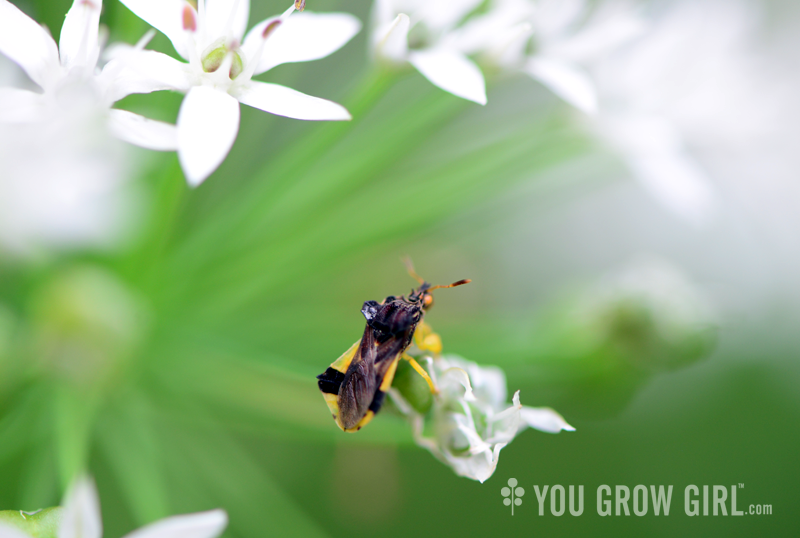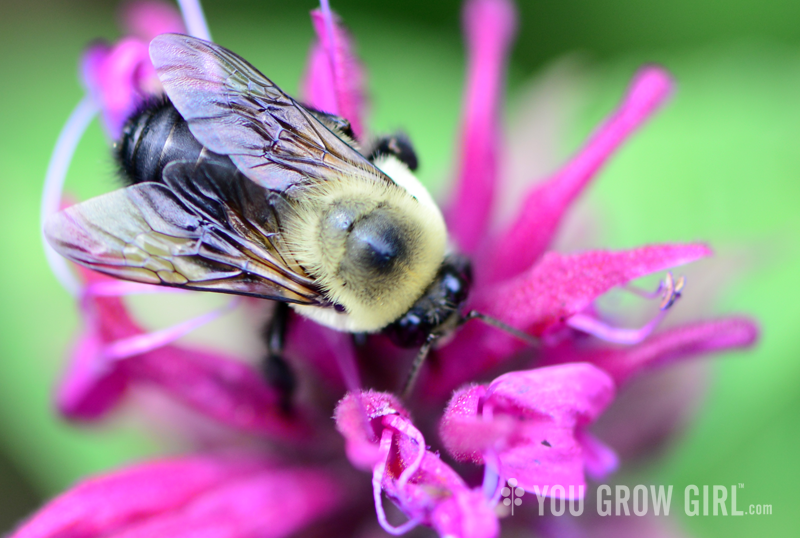
“What if rather than saying, “The garden belongs to me,” you said, “I belong to the garden.”
– from my book, Grow Curious
I’ve been thinking about this a lot over the years and have picked away at it in big and small ways [see No More War in the Garden]. As a young university student I took a few courses on semiotics, culture, and language. We were taught that language reflects our reality, but also constructs it, and that naming can be a way of exerting and asserting hierarchies of power. How does how we speak about the garden reflect and inform how we see and relate to the garden? And if each of our gardens, wherever they may be, are tiny, yet significant pieces of this big earth — connected to and not detached or separate from — not a place of ownership (as our common use of “my garden” suggests) but one of stewardship… Then how does shifting our language and consequently shifting our perspective change us? What is the potential to be found there?

Case in point: when I was writing the intro to Grow Curious: Creative Activities to Cultivate Joy, Wonder, and Discover in Your Garden, I said about my relationship to the garden, “I think I am its mother, but in truth it is mine.” That was a powerful line for me to write as it succinctly encapsulated the weight and depth of gardening’s importance and place in my life. I wrote that sentence and then I spent about a month agonizing over the pronouns. In the english language, the use of “its” suggests an object. Plants, insects, and gardens are living subjects, yet we refer to them as inert things as if they are a shoe or a spoon or some other item to be possessed and unworthy of our respect. Things that are beneath us rather than beings that we can share a relationship with and even belong to. It’s common to substitute “it” for “she” when speaking of nature, i.e. mother earth, but I was uncomfortable with that because to me, nature feels above and beyond gendered pronouns, and frankly, women and the feminine are not respected or valued in this culture anyways. I thought about using “them”, but I was new to making such a stark shift in my language usage and I felt awkward if not a bit insecure about it. I worried it would confuse readers or that I would be judged as a weirdo and my words overlooked and not taken seriously as a result. I still feel all of these things, but I am committed to making a very direct and concerted effort to consistently alter my language until I no longer feel hyperaware and insecure about it. And in turn, until my readers also come to expect it. I can’t do this when writing for paying publications, but I can when writing here and elsewhere for myself.

Along this journey I have found the work of botanist Robin Wall Kimmerer to be both inspiring and reassuring. In an article entitled, Nature Needs a New Pronoun: To Stop the Age of Extinction, Let’s Start by Ditching “It”, she makes the argument that language is evolving and that shifting the pronouns we use for the living world in the age of climate change and mass extinction is what is needed to subvert the culture of colonialism and imperialism that dominates our ways of being and allows us to keep exploiting the earth. She suggests the words “ki” and “kin” (singular and plural). She derived “ki” from the ending of an Anishinaabe word, “bimaadiziaki,” which translates to “a living being of the earth.” I’m a little uncomfortable with the possible appropriation related to using “ki,” but have taken to using “kin” or “them” where appropriate. I don’t think we all have to agree on a specific language, but rather it is the meaning that matters.
“The language of objectification and possession is deeply rooted in the english language. We consume and we own, therefore we are. My garden. My soil. My plants.”

All of this is surprisingly hard work. The language of objectification and possession is deeply rooted in the english language. We consume and we own, therefore we are. My garden. My soil. My plants. Our relationship to the world around us as one of ownership is an easy written shorthand. Moving away from that is not always as simple as changing “it” to “kin.” It can also require restructuring an entire sentence, making it wordier and even somewhat confusing. I’ve also found that the expectation of possession and hierarchy in relationship to non-human beings is so deeply ingrained that it feels weird to order language around equality and kinship. For example, I ran into this the other day when referring to the soil in the garden. I would have had to switch from, the soil in my garden, to, the soil in the garden of the place where I live or something equally convoluted in order to avoid speaking possessively of the soil, the land, and the home. Making this transition has been an eye opener for me as it calls out my own inherent, deeply entrenched bias.
I look forward to finding out where this shift in language takes me and hope you will consider coming along and trying it out yourself. I’d love to hear about your thoughts and experiences with this. Please comment below.
I particularly love the usage of “kin” because of its connotation — “kin” is an old word for family, and nothing is more familial than a garden that provides food and beauty to us in exchange for our work.
I agree. All beings are our ancestors and the word kin reinforces that for me.
I just read Robin Wall Kimmerer’s book “Braiding Sweetgrass” for the first time last week. So many things keep guiding me back to her words. I read the caption under your top photo, I immediately thought of her book again, and wanted to suggest that you might like that book. Well, uh, nevermind :)
I’m not a native speaker, but I do absolutely understand you wishing to have a new pronoun that does reflect the uniqueness of nature (respectively a/”your” garden). And yes, why not use “ki” or “kin” to raise awarness to the fact, that nature isn’t just “it”.
But: I do not at all agree with your proposal describing the soil in “your” garden with “the soil in the garden of the place where I live”. It is, despite of the often misused pronouns “my, your, our…” actually your garden. You know it best. You see “it” in all “its” beauty and richness and “power”. You know the plants. You know, when you planted them. You know, where you got your plants or seeds from. You care for “it”. You know, where to expect the first flowers in spring. You see the garden and “its” magic as no one other does. So: “It” is your garden. Perhaps not only yours. Perhaps someone other has seen other things in “it” (or will). But for now: It’s yours. And you are “its”. As you wrote: A mutual belonging.
I agree with this perspective. I just wish that the words “my garden” leaned more toward belonging as the meaning, as opposed to ownership. I feel that in this culture, we tend to think of anything that is not human as a thing that is owned and our behaviour tends to follow suit as a result.
I also agree that this garden is not only mine. There are many other creatures who live within, visit, and rely on the resources here for survival. It is a shared belonging and keeping that in focus means that I remember to act accordingly when making decisions about what and how I grow here.
Me too. I was thinking of that book as I read the first paragraph, so love that it was tied in. It’s a wonderful book, and one that I should reread this winter.
What do you think of using a proper name to avoid the possessive? Like calling it the Garden (“Why hello, Garden. It’s great to come visit you today…” I can’t decide if it’s dopey or would be a sign of respect, if I could relate to my garden as it’s own entity.
But if there are multiple gardens in the place where I live, then each a name And I’d have to wait for them (kin) to tell me, I guess.
I find I already do use that terminology, just without capitalization. I often say, “the garden” as opposed to “my garden.” I assume that in context people will understand that I am referring to this garden that I live with and not another. I used to cultivate multiple garden spaces at one time so it would not have worked then. I also use “the garden” to connote all of our gardens in the plural or grander sense.
Interesting topic and comments. I have developed an almost spiritual connection to the garden and found myself slipping into a slight depression at the end of her season. I enjoy the idea that we do not own the garden any more than we own people. On a similar note I found this quote this morning ” Let the beauty we love be what we do. There are hundreds of ways to kneel and kiss the ground.” Rumi
Yes, the season away from the garden can be tough. We’re already going into a darker period as-is, but being away from a practice we are so connected with can be challenging. I wholly agree with the quote. Wonder is my religion and the garden is where I go to practice and pray.
I do get your point, I think, and am glad that in German, we don’t really have that problem: garden and soil are female. Also, table is, so there is not such a harsh break between objects and subjects.
However, I love language. I think it is one of our biggest blessings and achievements and we should be careful not to dabble with it in a way that might bring more harm than good. That’s why I am a skeptic to all who want to change the very structure of what shaped my mind and my understanding of the world – after all, I don’t see the garden as a thing although language is supposed to be a threat to that.
I also use words that can both be interpreted as signs of ownership or belonging. Since I guerilla garden, ownership never really crossed my thoughts. Still I am furious if someone destroys something in my garden. And I should be (apart from then learning to accept, maybe forgive, get my peace back and start over). Belonging – and maybe even ownership – also have positive aspects: you only care for what belongs to you. Only belonging or ownership isn’t necessarily such a ghastly tyrannical action as it sometimes seems.
Sometimes I wonder where my mind was when typing. Garden is male in German, soil is female, table is male. The point I tried to make remains valid, though …